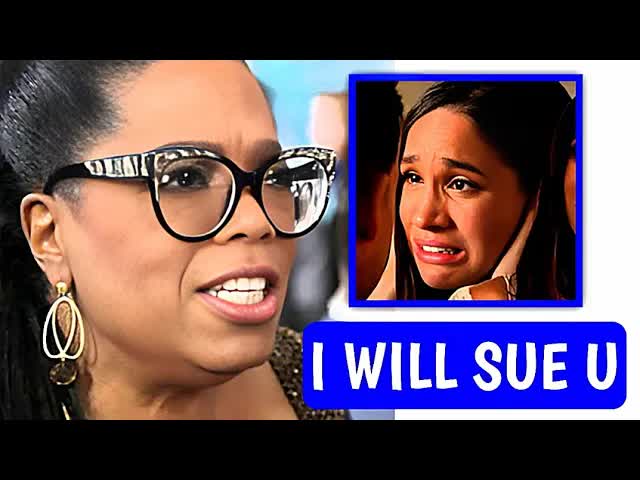Must Read
Unpacking Prince Harry’s “Spare”: A Journey Through Turmoil, Therapy, and the Oprah Connection
Prince Harry and Meghan Markle have long been in the public eye, but it's their personal struggles that are currently making waves.
Harry's memoir, “Spare,” offers a raw glimpse into his mental health battles, revealing the emotional toll of royal life.
Yet, one question lingers: what role did Oprah Winfrey play in this narrative?
While she denies acting as a therapist, the curiosity surrounding her influence persists.
Let's dive into the revelations from Harry's memoir and explore the dynamics of his journey to healing.
Within the confines of royal life, a hidden drama unfolds.
In “Spare,” Harry reflects on the profound grief he experienced following his mother's death when he was just 12 years old.
The rigid royal protocols felt alien and cold to him.
What happens to a young boy who is forced to suppress his sorrow?
This pivotal moment raises the possibility that it ignited Harry's quest for therapy and ultimately, self-discovery.
The explosive 2021 interview with Oprah marked a turning point for Harry and Meghan.
Their candid revelations about the challenges they faced within the royal family sent shockwaves around the world.
Meghan opened up about her mental health struggles, while Harry shared his own emotional turmoil.
This led many to ponder whether Oprah assumed a therapeutic role during their conversation.
Although she insists she wasn't a therapist, her questioning style certainly prompted deep reflection.
Did her inquiries provide a necessary outlet for Harry's feelings?
Harry's journey through therapy is depicted as a transformative process in “Spare.”
He likens it to peeling back layers of an onion, confronting the suppressed anger and trauma of his childhood.
His willingness to discuss these experiences is both inspiring and thought-provoking.
Was Harry's dedication to therapy a radical departure from royal norms?
The memoir also sheds light on Harry's strained relationship with his brother, Prince William.
Once inseparable, they now find themselves at odds, largely due to Harry's marriage to Meghan and his decision to step back from royal duties.
A particularly shocking revelation involves a physical altercation between the brothers, after which Harry sought immediate support from his therapist.
Did William misinterpret Harry's need for help, believing he was being influenced by therapy?
This rift illustrates a clash of perspectives between two brothers navigating their roles in very different ways.
Among the various conflicts described in “Spare,” the alleged feud between Meghan and Catherine over a flower girl dress stands out.
Media narratives suggested Meghan made Catherine cry, but Meghan clarified during the Oprah interview that the incident unfolded differently.
Harry adds nuance to the story, suggesting it stemmed from a cultural misunderstanding.
By sharing these personal anecdotes, Harry prompts us to consider how much of the tension was genuine and how much was sensationalized by the press.
Harry's candid account of his mental health struggles resonates deeply.
He discusses moments of explosive anger, including outbursts directed at Meghan.
Therapy has helped him navigate these emotions, illustrating that healing is a gradual process rather than an instant solution.
This revelation makes us reflect: how many of us carry unaddressed pain beneath the surface?
As we examine Oprah's involvement, one must question whether she was merely an interviewer or if she played a more supportive role.
The chemistry between Oprah and the couple hints at something deeper, as she has consistently championed mental health awareness.
While Oprah maintains she wasn't a therapist, her ability to create a safe space for Harry and Meghan raises intriguing questions about the nature of support outside traditional therapy.
Is it enough to simply have friends who listen?
In “Spare,” Harry grapples with the tension between royal obligations and personal freedom.
He felt the weight of tradition while yearning to carve out his identity.
Therapy illuminated the necessity of breaking free from royal constraints—a struggle many can relate to when faced with choosing between family expectations and personal happiness.
Is there a way to balance both?
Life beyond the palace walls has been a rollercoaster for Harry and Meghan.
They've faced numerous challenges but have also forged a path that reflects their values.
However, as Harry's memoir illustrates, their journey is far from straightforward.
Will their story redefine the monarchy, or will it serve as a cautionary tale about the costs of stepping away?
Harry's overarching mission in “Spare” is clear: he aims to foster discussions about mental health, family dynamics, and personal freedom.
His narrative reveals that privilege does not shield one from hardship.
The memoir ignites conversations about the human experience, healing, and empathy.
Regardless of Oprah's role, the emphasis on mental wellness is paramount.
As we reflect on Harry's journey, it's evident that the psychological toll of royal life is immense.
He describes living under constant scrutiny, comparing it to existing beneath a magnifying glass.
The pressures intensified after Princess Diana's tragic passing, leaving Harry grappling with the complexities of grief and expectation.
His reflections prompt us to consider how many individuals silently bear the weight of unprocessed trauma, all while maintaining a façade of strength.
Harry's candidness about therapy marks a significant shift in royal tradition.
For generations, the monarchy has adhered to a culture of emotional repression.
Yet, through “Spare,” Harry champions vulnerability as a form of strength.
By openly discussing his struggles, he invites a new understanding of courage—one that embraces the messy realities of life.
As “Spare” continues to resonate with readers, it's clear that Harry seeks to leave a legacy of empathy and mental health advocacy.
He hopes to inspire others to confront their own challenges and pursue help without shame.
His story transcends royal boundaries, encouraging a broader dialogue about mental health and the importance of sharing our truths.








































